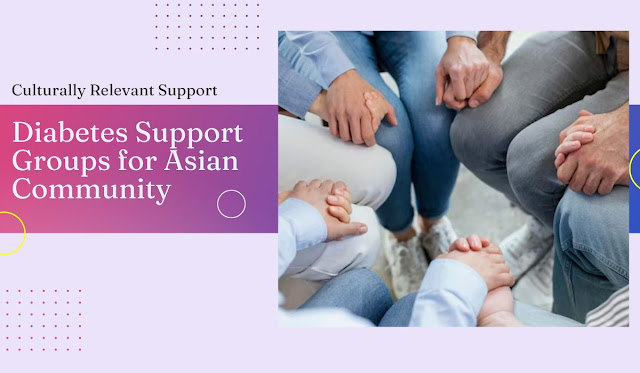Addressing Unique Challenges: Diabetes Support Groups for Asian Individuals
The worldwide prevalence of diabetes poses a significant health challenge impacting a vast number of individuals. While diabetes does not discriminate based on ethnicity, it is essential to recognize that different cultural and ethnic groups may face unique challenges when managing this chronic condition. Asian individuals, in particular, have distinctive cultural and dietary factors that can impact diabetes management. In response to these specific challenges, diabetes support groups for Asian communities are emerging as valuable resources. In this blog, we'll explore the unique challenges faced by Asian individuals with diabetes and how support groups are addressing these issues.
Unique Challenges for Asian Individuals with Diabetes
- Cultural Dietary Practices: Asian diets tend to be rich in carbohydrates, which can pose challenges for individuals with diabetes. The traditional consumption of rice, noodles, and other high-carb foods can lead to blood sugar spikes if not managed properly.
- Stigma and Misconceptions: In some Asian cultures, there may be a stigma associated with diabetes, leading to a reluctance to openly discuss the condition. This can hinder individuals from seeking necessary support and medical care.
- Genetic Predisposition: Some Asian populations have a genetic predisposition to diabetes, making it even more critical to address the condition effectively.
- Limited Awareness: Awareness about diabetes and its management techniques may be limited within Asian communities, leading to delayed diagnosis and suboptimal care.
- Language Barriers: In some cases, individuals from Asian backgrounds may face language barriers when trying to access diabetes education and healthcare services.
How Diabetes Support Groups Benefit Asian Communities
Diabetes support groups designed specifically for Asian individuals can play a pivotal role in addressing the unique challenges they face. Here's how these support groups can benefit the community:
- Cultural Relevance: Support groups tailored to Asian communities are culturally sensitive and understand the nuances of Asian dietary practices and lifestyle. This cultural relevance ensures that the information and advice provided are appropriate for participants.
- Language Access: Many Asian-specific support groups offer materials and sessions in multiple Asian languages to address language barriers, ensuring that all participants can access valuable information and resources.
- Community and Connection: These support groups foster a sense of community and belonging, making it easier for participants to share their experiences and challenges with others who understand their cultural and dietary context.
- Education and Awareness: Support groups offer diabetes education and awareness programs that are culturally tailored. This includes information about traditional Asian foods, portion control, and strategies for blood sugar management within the context of Asian cuisine.
- Breaking Stigmas: Support groups can help break down stigmas related to diabetes within the Asian community. By openly discussing the condition and sharing success stories, these groups empower individuals to take control of their health.
- Emotional Support: Managing diabetes can be emotionally challenging. Support groups provide a safe space for individuals to express their concerns, fears, and frustrations and receive emotional support from peers who can relate.
Examples of Diabetes Support Groups for Asian Communities
Several organizations and communities have recognized the need for diabetes support tailored to Asian individuals. Here are a few examples of such support groups and initiatives:
- The South Asian Health Solution: The South Asian Health Solution, led by Dr. Ronesh Sinha, focuses on empowering South Asians to manage their health effectively. They provide resources, workshops, and webinars specifically addressing diabetes and metabolic health within the South Asian community.
- The Chinese Canadian Diabetes Association: This organization provides culturally sensitive diabetes education and support for Chinese Canadians. They offer educational materials, workshops, and events in both Mandarin and Cantonese, ensuring accessibility for the community.
- The Japanese American National Museum: This museum, located in Los Angeles, has hosted events and exhibitions focused on diabetes awareness and prevention within the Japanese American community. These events aim to provide cultural context while addressing diabetes.
- The Diabetes Education Program for Filipino Americans: This program provides diabetes education and support tailored to the Filipino American community, offering resources, workshops, and support groups. They recognize the specific dietary and cultural aspects of Filipino cuisine and address them in their educational materials.
How to Find a Diabetes Support Group for Asian Communities
If you or someone you know is interested in joining a diabetes support group tailored to Asian communities, here are some steps to help you get started:
- Search Online: Use online resources to search for diabetes support groups specific to Asian communities. Websites and social media platforms may provide information on local groups or virtual meetings.
- Contact Local Healthcare Providers: Reach out to local healthcare providers, clinics, and hospitals to inquire about support groups designed for Asian individuals with diabetes.
- Connect with Community Centers: Many community centers, cultural organizations, and religious institutions may host diabetes support groups or awareness events for their communities. Inquire at these centers to learn more.
- Ask for Referrals: If you are already receiving diabetes care, ask your healthcare provider for recommendations on local or online support groups that cater to Asian individuals.
- Join Online Communities: Online forums and social media groups dedicated to diabetes management may have members from diverse backgrounds, including Asian individuals. Valuable reservoirs of knowledge and support are found within these communities.
In Conclusion
Diabetes is a complex condition that requires careful management, and for Asian individuals, this can come with unique challenges due to cultural, dietary, and other factors. Diabetes support groups for Asian communities are instrumental in addressing these challenges by providing culturally relevant education, fostering a sense of community, and breaking down stigmas. If you or someone you know is managing diabetes within an Asian community, these support groups can be a valuable resource on the journey to better health and well-being.


.jpg)
Comments